Analysis of Managing People in a Global Context: Report
VerifiedAdded on 2022/10/18
|12
|3037
|8
Report
AI Summary
This report provides a comprehensive overview of international human resource management (IHRM), exploring key concepts through the lens of real-world experiences. The report begins by examining cross-cultural differences encountered during international business expansion, highlighting the importance of adapting to new cultures and understanding various IHRM strategies like ethnocentric, polycentric, geocentric and regiocentric approaches. It then delves into the dynamics of dual-career couples, discussing the challenges and opportunities they face, and the importance of balancing career demands with personal life. The report also addresses expatriation and repatriation, discussing the processes involved in international assignments and the skills needed to manage human resources effectively in a global context. The author reflects on personal experiences, offering insights into the complexities of global people management and suggesting practical strategies for navigating cultural differences and career challenges. This report offers a valuable perspective for students and professionals in the field of HRM.
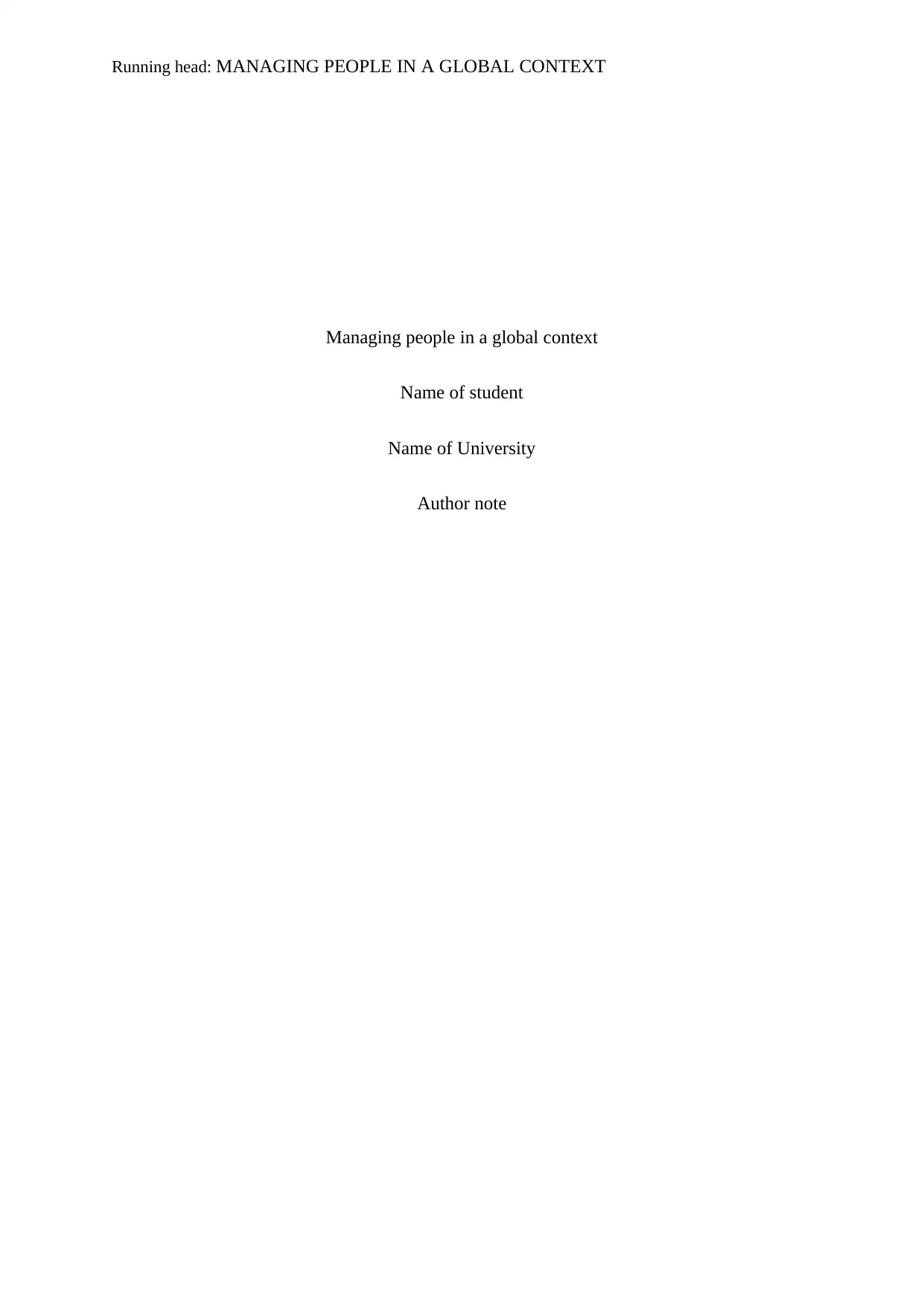
Running head: MANAGING PEOPLE IN A GLOBAL CONTEXT
Managing people in a global context
Name of student
Name of University
Author note
Managing people in a global context
Name of student
Name of University
Author note
Paraphrase This Document
Need a fresh take? Get an instant paraphrase of this document with our AI Paraphraser
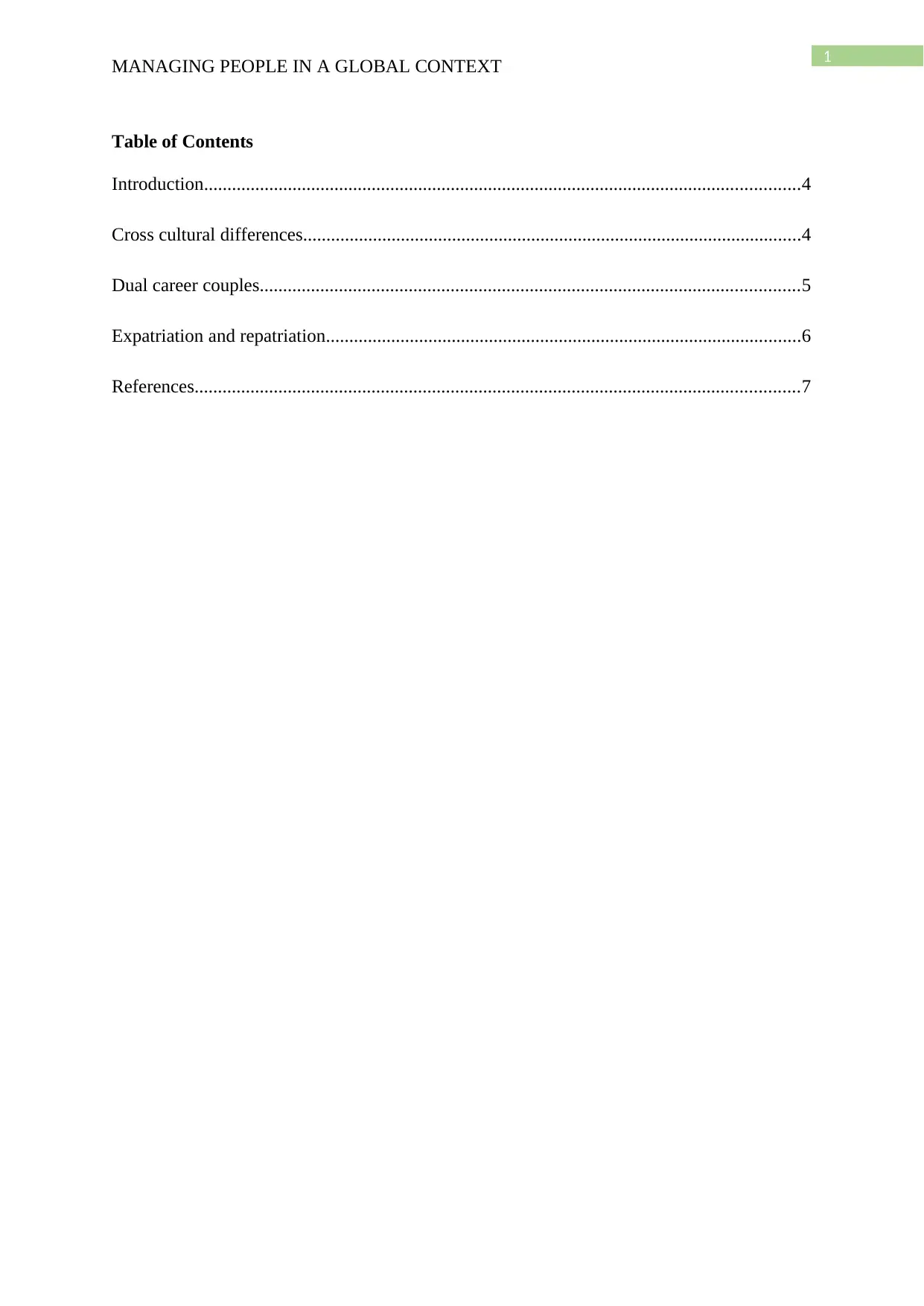
1
MANAGING PEOPLE IN A GLOBAL CONTEXT
Table of Contents
Introduction................................................................................................................................4
Cross cultural differences...........................................................................................................4
Dual career couples....................................................................................................................5
Expatriation and repatriation......................................................................................................6
References..................................................................................................................................7
MANAGING PEOPLE IN A GLOBAL CONTEXT
Table of Contents
Introduction................................................................................................................................4
Cross cultural differences...........................................................................................................4
Dual career couples....................................................................................................................5
Expatriation and repatriation......................................................................................................6
References..................................................................................................................................7
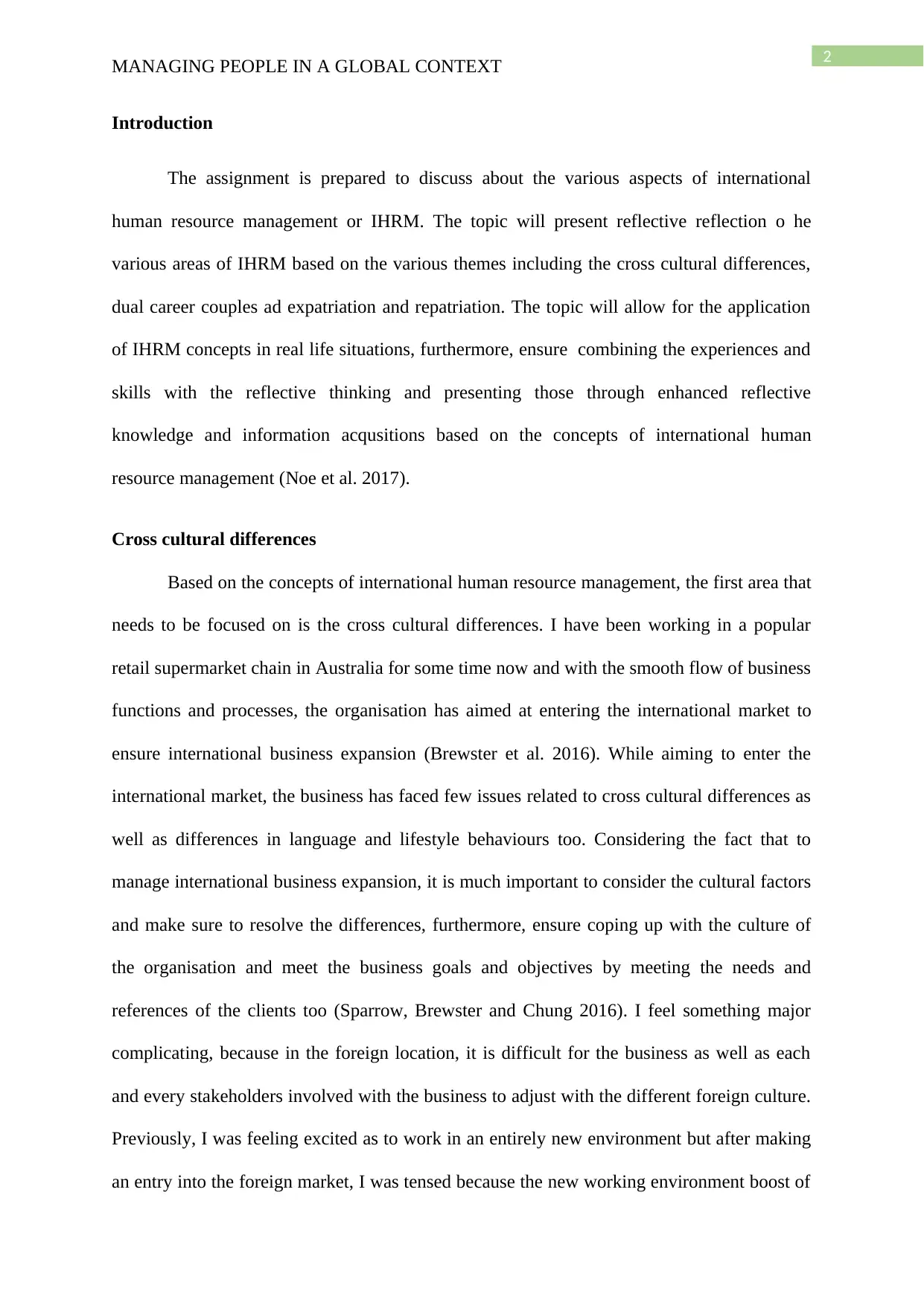
2
MANAGING PEOPLE IN A GLOBAL CONTEXT
Introduction
The assignment is prepared to discuss about the various aspects of international
human resource management or IHRM. The topic will present reflective reflection o he
various areas of IHRM based on the various themes including the cross cultural differences,
dual career couples ad expatriation and repatriation. The topic will allow for the application
of IHRM concepts in real life situations, furthermore, ensure combining the experiences and
skills with the reflective thinking and presenting those through enhanced reflective
knowledge and information acqusitions based on the concepts of international human
resource management (Noe et al. 2017).
Cross cultural differences
Based on the concepts of international human resource management, the first area that
needs to be focused on is the cross cultural differences. I have been working in a popular
retail supermarket chain in Australia for some time now and with the smooth flow of business
functions and processes, the organisation has aimed at entering the international market to
ensure international business expansion (Brewster et al. 2016). While aiming to enter the
international market, the business has faced few issues related to cross cultural differences as
well as differences in language and lifestyle behaviours too. Considering the fact that to
manage international business expansion, it is much important to consider the cultural factors
and make sure to resolve the differences, furthermore, ensure coping up with the culture of
the organisation and meet the business goals and objectives by meeting the needs and
references of the clients too (Sparrow, Brewster and Chung 2016). I feel something major
complicating, because in the foreign location, it is difficult for the business as well as each
and every stakeholders involved with the business to adjust with the different foreign culture.
Previously, I was feeling excited as to work in an entirely new environment but after making
an entry into the foreign market, I was tensed because the new working environment boost of
MANAGING PEOPLE IN A GLOBAL CONTEXT
Introduction
The assignment is prepared to discuss about the various aspects of international
human resource management or IHRM. The topic will present reflective reflection o he
various areas of IHRM based on the various themes including the cross cultural differences,
dual career couples ad expatriation and repatriation. The topic will allow for the application
of IHRM concepts in real life situations, furthermore, ensure combining the experiences and
skills with the reflective thinking and presenting those through enhanced reflective
knowledge and information acqusitions based on the concepts of international human
resource management (Noe et al. 2017).
Cross cultural differences
Based on the concepts of international human resource management, the first area that
needs to be focused on is the cross cultural differences. I have been working in a popular
retail supermarket chain in Australia for some time now and with the smooth flow of business
functions and processes, the organisation has aimed at entering the international market to
ensure international business expansion (Brewster et al. 2016). While aiming to enter the
international market, the business has faced few issues related to cross cultural differences as
well as differences in language and lifestyle behaviours too. Considering the fact that to
manage international business expansion, it is much important to consider the cultural factors
and make sure to resolve the differences, furthermore, ensure coping up with the culture of
the organisation and meet the business goals and objectives by meeting the needs and
references of the clients too (Sparrow, Brewster and Chung 2016). I feel something major
complicating, because in the foreign location, it is difficult for the business as well as each
and every stakeholders involved with the business to adjust with the different foreign culture.
Previously, I was feeling excited as to work in an entirely new environment but after making
an entry into the foreign market, I was tensed because the new working environment boost of
⊘ This is a preview!⊘
Do you want full access?
Subscribe today to unlock all pages.

Trusted by 1+ million students worldwide
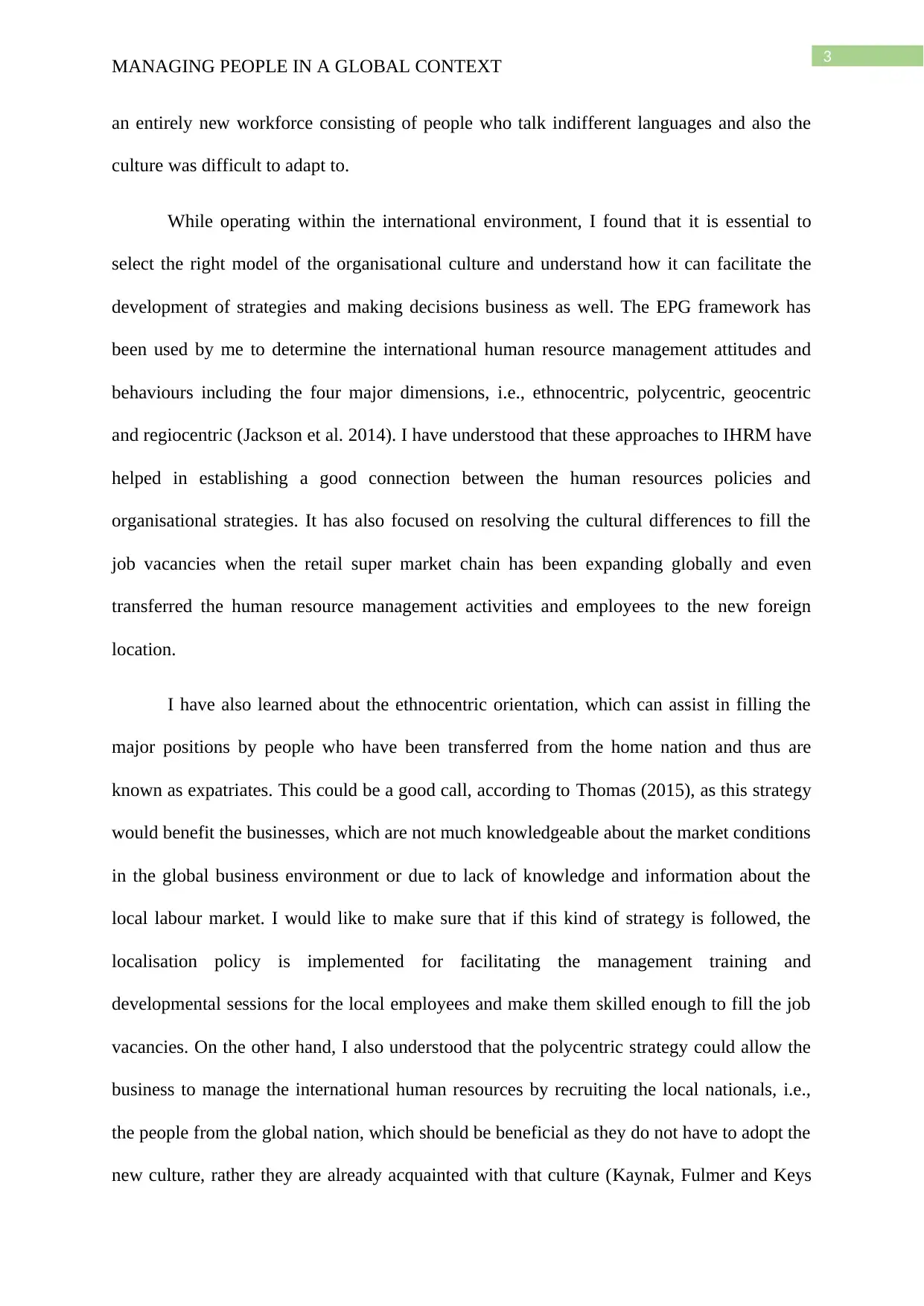
3
MANAGING PEOPLE IN A GLOBAL CONTEXT
an entirely new workforce consisting of people who talk indifferent languages and also the
culture was difficult to adapt to.
While operating within the international environment, I found that it is essential to
select the right model of the organisational culture and understand how it can facilitate the
development of strategies and making decisions business as well. The EPG framework has
been used by me to determine the international human resource management attitudes and
behaviours including the four major dimensions, i.e., ethnocentric, polycentric, geocentric
and regiocentric (Jackson et al. 2014). I have understood that these approaches to IHRM have
helped in establishing a good connection between the human resources policies and
organisational strategies. It has also focused on resolving the cultural differences to fill the
job vacancies when the retail super market chain has been expanding globally and even
transferred the human resource management activities and employees to the new foreign
location.
I have also learned about the ethnocentric orientation, which can assist in filling the
major positions by people who have been transferred from the home nation and thus are
known as expatriates. This could be a good call, according to Thomas (2015), as this strategy
would benefit the businesses, which are not much knowledgeable about the market conditions
in the global business environment or due to lack of knowledge and information about the
local labour market. I would like to make sure that if this kind of strategy is followed, the
localisation policy is implemented for facilitating the management training and
developmental sessions for the local employees and make them skilled enough to fill the job
vacancies. On the other hand, I also understood that the polycentric strategy could allow the
business to manage the international human resources by recruiting the local nationals, i.e.,
the people from the global nation, which should be beneficial as they do not have to adopt the
new culture, rather they are already acquainted with that culture (Kaynak, Fulmer and Keys
MANAGING PEOPLE IN A GLOBAL CONTEXT
an entirely new workforce consisting of people who talk indifferent languages and also the
culture was difficult to adapt to.
While operating within the international environment, I found that it is essential to
select the right model of the organisational culture and understand how it can facilitate the
development of strategies and making decisions business as well. The EPG framework has
been used by me to determine the international human resource management attitudes and
behaviours including the four major dimensions, i.e., ethnocentric, polycentric, geocentric
and regiocentric (Jackson et al. 2014). I have understood that these approaches to IHRM have
helped in establishing a good connection between the human resources policies and
organisational strategies. It has also focused on resolving the cultural differences to fill the
job vacancies when the retail super market chain has been expanding globally and even
transferred the human resource management activities and employees to the new foreign
location.
I have also learned about the ethnocentric orientation, which can assist in filling the
major positions by people who have been transferred from the home nation and thus are
known as expatriates. This could be a good call, according to Thomas (2015), as this strategy
would benefit the businesses, which are not much knowledgeable about the market conditions
in the global business environment or due to lack of knowledge and information about the
local labour market. I would like to make sure that if this kind of strategy is followed, the
localisation policy is implemented for facilitating the management training and
developmental sessions for the local employees and make them skilled enough to fill the job
vacancies. On the other hand, I also understood that the polycentric strategy could allow the
business to manage the international human resources by recruiting the local nationals, i.e.,
the people from the global nation, which should be beneficial as they do not have to adopt the
new culture, rather they are already acquainted with that culture (Kaynak, Fulmer and Keys
Paraphrase This Document
Need a fresh take? Get an instant paraphrase of this document with our AI Paraphraser
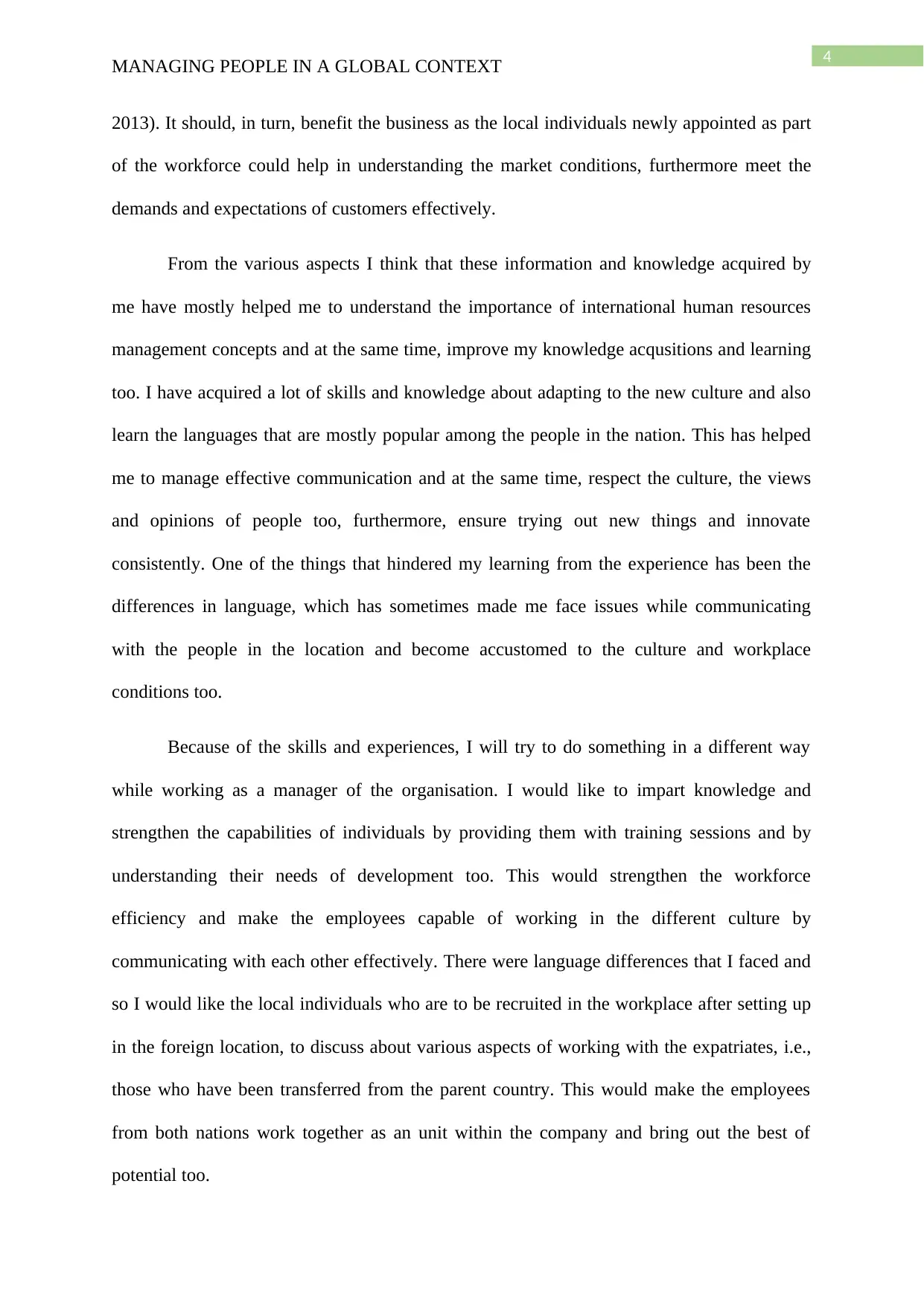
4
MANAGING PEOPLE IN A GLOBAL CONTEXT
2013). It should, in turn, benefit the business as the local individuals newly appointed as part
of the workforce could help in understanding the market conditions, furthermore meet the
demands and expectations of customers effectively.
From the various aspects I think that these information and knowledge acquired by
me have mostly helped me to understand the importance of international human resources
management concepts and at the same time, improve my knowledge acqusitions and learning
too. I have acquired a lot of skills and knowledge about adapting to the new culture and also
learn the languages that are mostly popular among the people in the nation. This has helped
me to manage effective communication and at the same time, respect the culture, the views
and opinions of people too, furthermore, ensure trying out new things and innovate
consistently. One of the things that hindered my learning from the experience has been the
differences in language, which has sometimes made me face issues while communicating
with the people in the location and become accustomed to the culture and workplace
conditions too.
Because of the skills and experiences, I will try to do something in a different way
while working as a manager of the organisation. I would like to impart knowledge and
strengthen the capabilities of individuals by providing them with training sessions and by
understanding their needs of development too. This would strengthen the workforce
efficiency and make the employees capable of working in the different culture by
communicating with each other effectively. There were language differences that I faced and
so I would like the local individuals who are to be recruited in the workplace after setting up
in the foreign location, to discuss about various aspects of working with the expatriates, i.e.,
those who have been transferred from the parent country. This would make the employees
from both nations work together as an unit within the company and bring out the best of
potential too.
MANAGING PEOPLE IN A GLOBAL CONTEXT
2013). It should, in turn, benefit the business as the local individuals newly appointed as part
of the workforce could help in understanding the market conditions, furthermore meet the
demands and expectations of customers effectively.
From the various aspects I think that these information and knowledge acquired by
me have mostly helped me to understand the importance of international human resources
management concepts and at the same time, improve my knowledge acqusitions and learning
too. I have acquired a lot of skills and knowledge about adapting to the new culture and also
learn the languages that are mostly popular among the people in the nation. This has helped
me to manage effective communication and at the same time, respect the culture, the views
and opinions of people too, furthermore, ensure trying out new things and innovate
consistently. One of the things that hindered my learning from the experience has been the
differences in language, which has sometimes made me face issues while communicating
with the people in the location and become accustomed to the culture and workplace
conditions too.
Because of the skills and experiences, I will try to do something in a different way
while working as a manager of the organisation. I would like to impart knowledge and
strengthen the capabilities of individuals by providing them with training sessions and by
understanding their needs of development too. This would strengthen the workforce
efficiency and make the employees capable of working in the different culture by
communicating with each other effectively. There were language differences that I faced and
so I would like the local individuals who are to be recruited in the workplace after setting up
in the foreign location, to discuss about various aspects of working with the expatriates, i.e.,
those who have been transferred from the parent country. This would make the employees
from both nations work together as an unit within the company and bring out the best of
potential too.
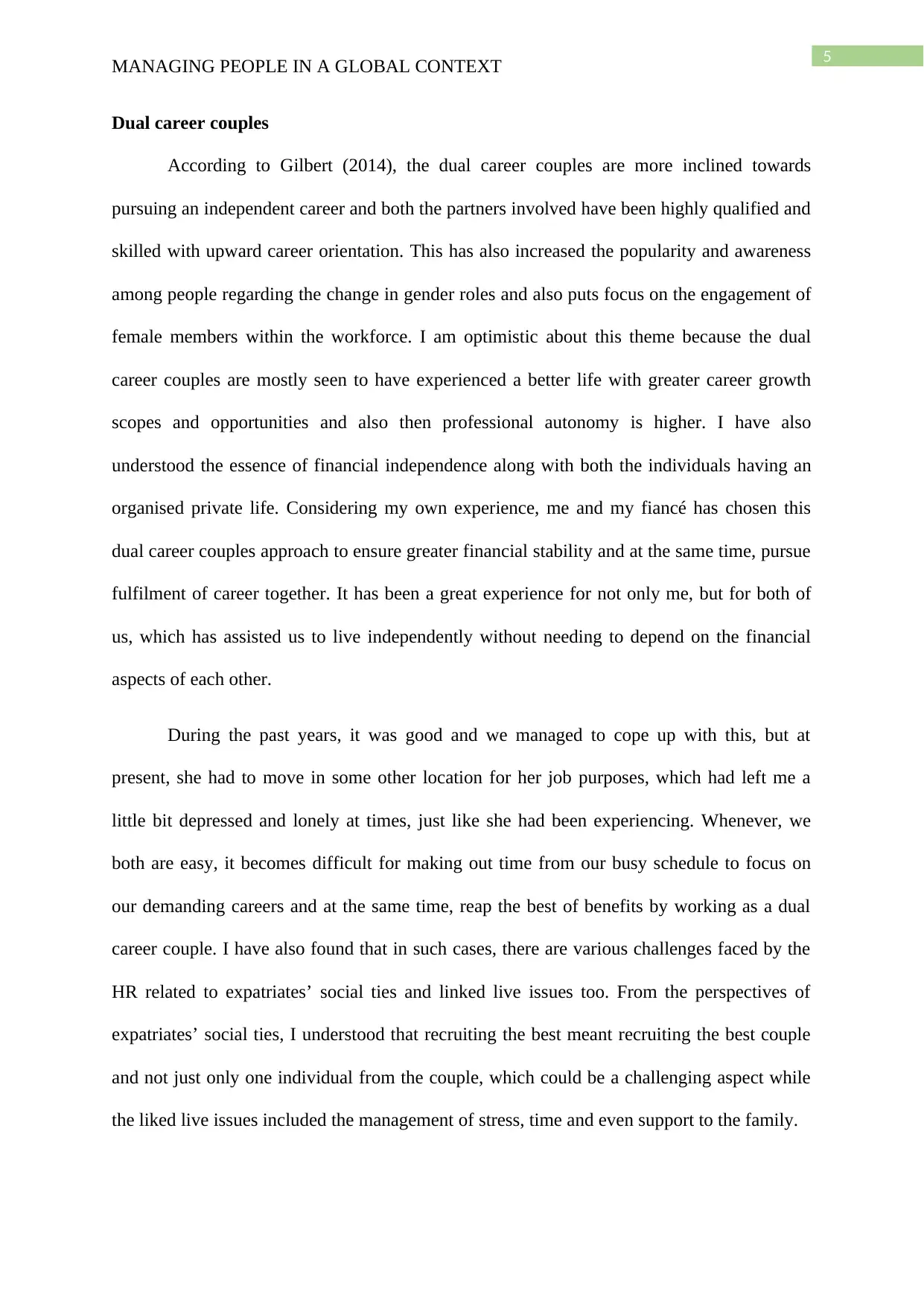
5
MANAGING PEOPLE IN A GLOBAL CONTEXT
Dual career couples
According to Gilbert (2014), the dual career couples are more inclined towards
pursuing an independent career and both the partners involved have been highly qualified and
skilled with upward career orientation. This has also increased the popularity and awareness
among people regarding the change in gender roles and also puts focus on the engagement of
female members within the workforce. I am optimistic about this theme because the dual
career couples are mostly seen to have experienced a better life with greater career growth
scopes and opportunities and also then professional autonomy is higher. I have also
understood the essence of financial independence along with both the individuals having an
organised private life. Considering my own experience, me and my fiancé has chosen this
dual career couples approach to ensure greater financial stability and at the same time, pursue
fulfilment of career together. It has been a great experience for not only me, but for both of
us, which has assisted us to live independently without needing to depend on the financial
aspects of each other.
During the past years, it was good and we managed to cope up with this, but at
present, she had to move in some other location for her job purposes, which had left me a
little bit depressed and lonely at times, just like she had been experiencing. Whenever, we
both are easy, it becomes difficult for making out time from our busy schedule to focus on
our demanding careers and at the same time, reap the best of benefits by working as a dual
career couple. I have also found that in such cases, there are various challenges faced by the
HR related to expatriates’ social ties and linked live issues too. From the perspectives of
expatriates’ social ties, I understood that recruiting the best meant recruiting the best couple
and not just only one individual from the couple, which could be a challenging aspect while
the liked live issues included the management of stress, time and even support to the family.
MANAGING PEOPLE IN A GLOBAL CONTEXT
Dual career couples
According to Gilbert (2014), the dual career couples are more inclined towards
pursuing an independent career and both the partners involved have been highly qualified and
skilled with upward career orientation. This has also increased the popularity and awareness
among people regarding the change in gender roles and also puts focus on the engagement of
female members within the workforce. I am optimistic about this theme because the dual
career couples are mostly seen to have experienced a better life with greater career growth
scopes and opportunities and also then professional autonomy is higher. I have also
understood the essence of financial independence along with both the individuals having an
organised private life. Considering my own experience, me and my fiancé has chosen this
dual career couples approach to ensure greater financial stability and at the same time, pursue
fulfilment of career together. It has been a great experience for not only me, but for both of
us, which has assisted us to live independently without needing to depend on the financial
aspects of each other.
During the past years, it was good and we managed to cope up with this, but at
present, she had to move in some other location for her job purposes, which had left me a
little bit depressed and lonely at times, just like she had been experiencing. Whenever, we
both are easy, it becomes difficult for making out time from our busy schedule to focus on
our demanding careers and at the same time, reap the best of benefits by working as a dual
career couple. I have also found that in such cases, there are various challenges faced by the
HR related to expatriates’ social ties and linked live issues too. From the perspectives of
expatriates’ social ties, I understood that recruiting the best meant recruiting the best couple
and not just only one individual from the couple, which could be a challenging aspect while
the liked live issues included the management of stress, time and even support to the family.
⊘ This is a preview!⊘
Do you want full access?
Subscribe today to unlock all pages.

Trusted by 1+ million students worldwide
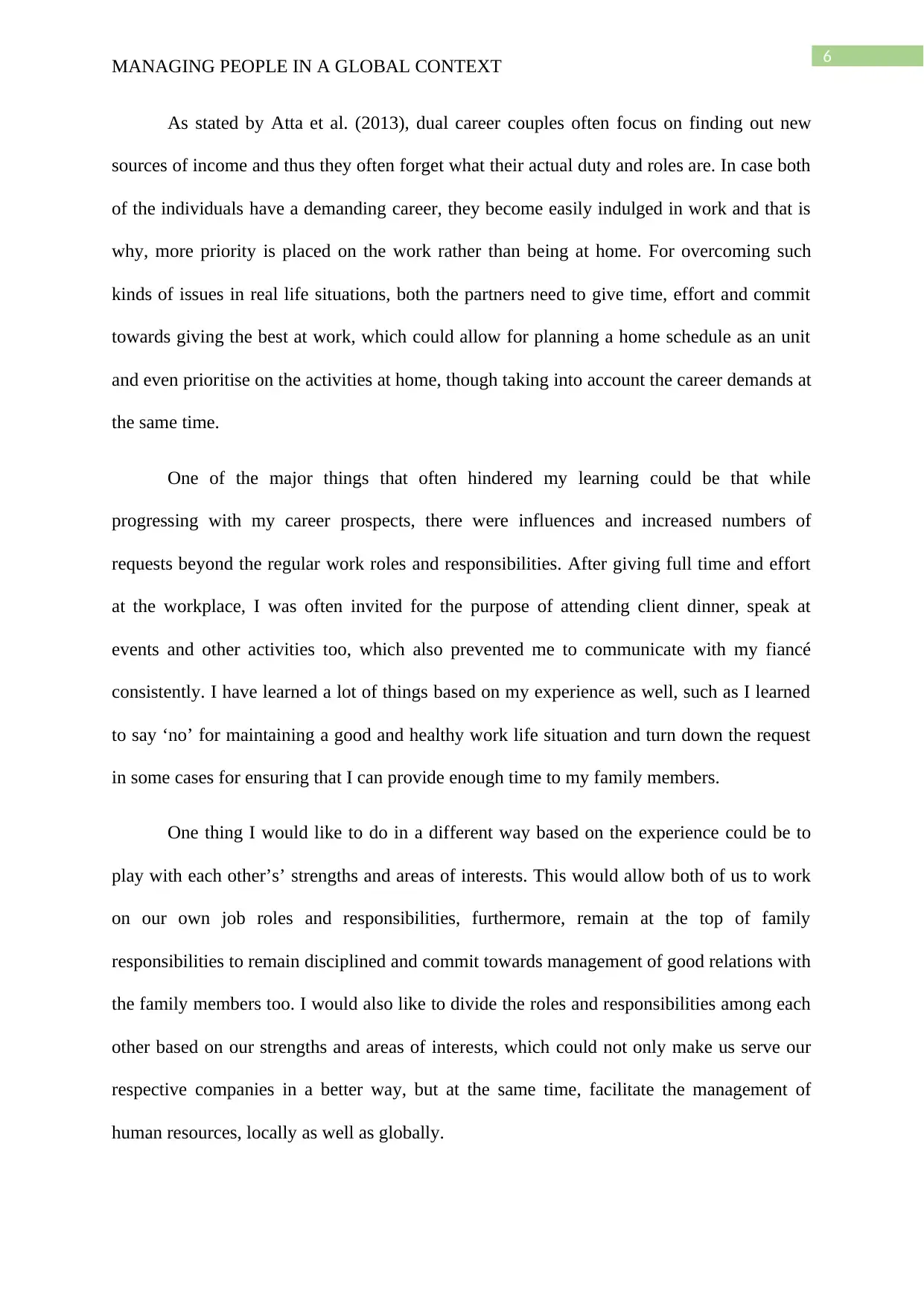
6
MANAGING PEOPLE IN A GLOBAL CONTEXT
As stated by Atta et al. (2013), dual career couples often focus on finding out new
sources of income and thus they often forget what their actual duty and roles are. In case both
of the individuals have a demanding career, they become easily indulged in work and that is
why, more priority is placed on the work rather than being at home. For overcoming such
kinds of issues in real life situations, both the partners need to give time, effort and commit
towards giving the best at work, which could allow for planning a home schedule as an unit
and even prioritise on the activities at home, though taking into account the career demands at
the same time.
One of the major things that often hindered my learning could be that while
progressing with my career prospects, there were influences and increased numbers of
requests beyond the regular work roles and responsibilities. After giving full time and effort
at the workplace, I was often invited for the purpose of attending client dinner, speak at
events and other activities too, which also prevented me to communicate with my fiancé
consistently. I have learned a lot of things based on my experience as well, such as I learned
to say ‘no’ for maintaining a good and healthy work life situation and turn down the request
in some cases for ensuring that I can provide enough time to my family members.
One thing I would like to do in a different way based on the experience could be to
play with each other’s’ strengths and areas of interests. This would allow both of us to work
on our own job roles and responsibilities, furthermore, remain at the top of family
responsibilities to remain disciplined and commit towards management of good relations with
the family members too. I would also like to divide the roles and responsibilities among each
other based on our strengths and areas of interests, which could not only make us serve our
respective companies in a better way, but at the same time, facilitate the management of
human resources, locally as well as globally.
MANAGING PEOPLE IN A GLOBAL CONTEXT
As stated by Atta et al. (2013), dual career couples often focus on finding out new
sources of income and thus they often forget what their actual duty and roles are. In case both
of the individuals have a demanding career, they become easily indulged in work and that is
why, more priority is placed on the work rather than being at home. For overcoming such
kinds of issues in real life situations, both the partners need to give time, effort and commit
towards giving the best at work, which could allow for planning a home schedule as an unit
and even prioritise on the activities at home, though taking into account the career demands at
the same time.
One of the major things that often hindered my learning could be that while
progressing with my career prospects, there were influences and increased numbers of
requests beyond the regular work roles and responsibilities. After giving full time and effort
at the workplace, I was often invited for the purpose of attending client dinner, speak at
events and other activities too, which also prevented me to communicate with my fiancé
consistently. I have learned a lot of things based on my experience as well, such as I learned
to say ‘no’ for maintaining a good and healthy work life situation and turn down the request
in some cases for ensuring that I can provide enough time to my family members.
One thing I would like to do in a different way based on the experience could be to
play with each other’s’ strengths and areas of interests. This would allow both of us to work
on our own job roles and responsibilities, furthermore, remain at the top of family
responsibilities to remain disciplined and commit towards management of good relations with
the family members too. I would also like to divide the roles and responsibilities among each
other based on our strengths and areas of interests, which could not only make us serve our
respective companies in a better way, but at the same time, facilitate the management of
human resources, locally as well as globally.
Paraphrase This Document
Need a fresh take? Get an instant paraphrase of this document with our AI Paraphraser
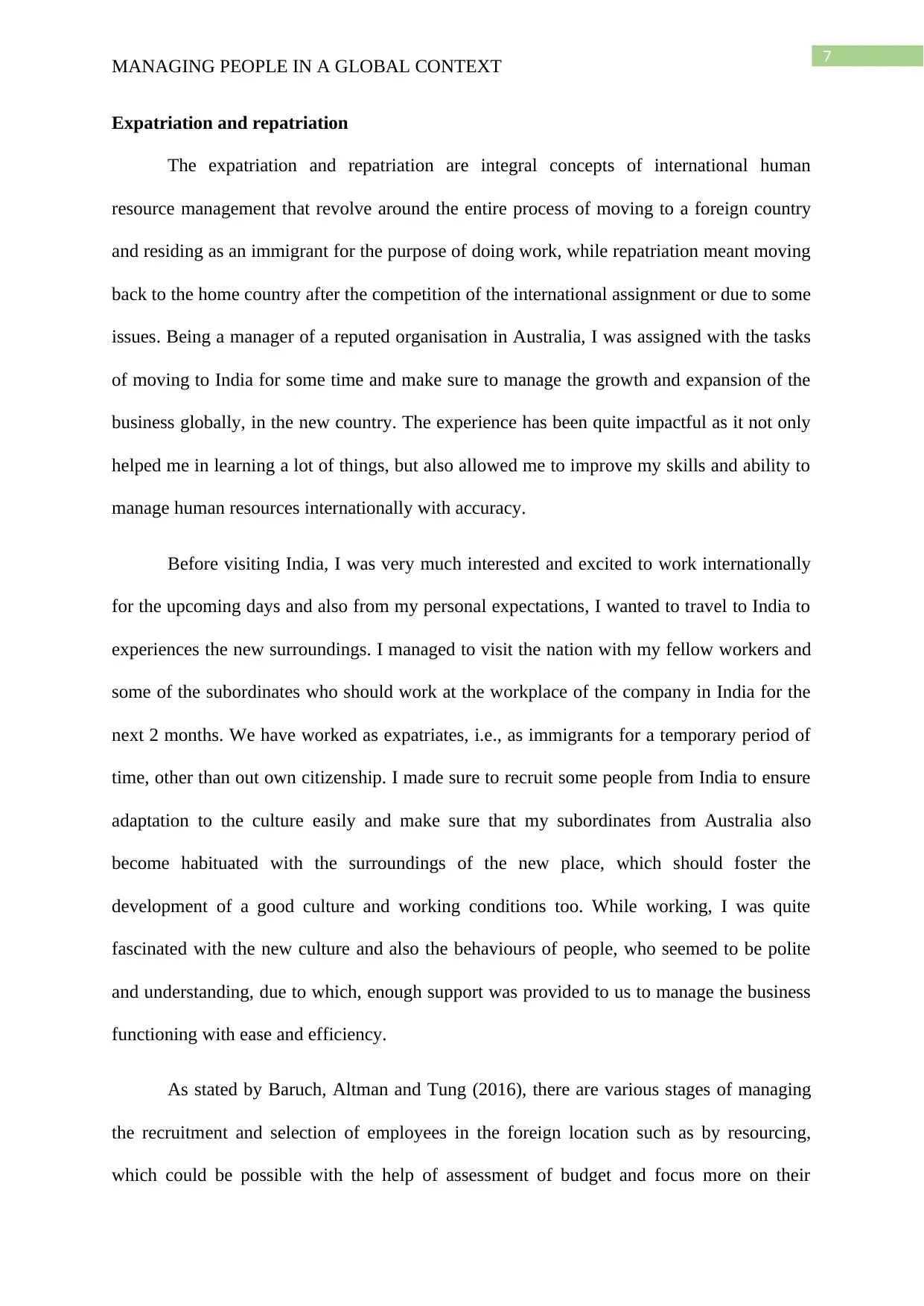
7
MANAGING PEOPLE IN A GLOBAL CONTEXT
Expatriation and repatriation
The expatriation and repatriation are integral concepts of international human
resource management that revolve around the entire process of moving to a foreign country
and residing as an immigrant for the purpose of doing work, while repatriation meant moving
back to the home country after the competition of the international assignment or due to some
issues. Being a manager of a reputed organisation in Australia, I was assigned with the tasks
of moving to India for some time and make sure to manage the growth and expansion of the
business globally, in the new country. The experience has been quite impactful as it not only
helped me in learning a lot of things, but also allowed me to improve my skills and ability to
manage human resources internationally with accuracy.
Before visiting India, I was very much interested and excited to work internationally
for the upcoming days and also from my personal expectations, I wanted to travel to India to
experiences the new surroundings. I managed to visit the nation with my fellow workers and
some of the subordinates who should work at the workplace of the company in India for the
next 2 months. We have worked as expatriates, i.e., as immigrants for a temporary period of
time, other than out own citizenship. I made sure to recruit some people from India to ensure
adaptation to the culture easily and make sure that my subordinates from Australia also
become habituated with the surroundings of the new place, which should foster the
development of a good culture and working conditions too. While working, I was quite
fascinated with the new culture and also the behaviours of people, who seemed to be polite
and understanding, due to which, enough support was provided to us to manage the business
functioning with ease and efficiency.
As stated by Baruch, Altman and Tung (2016), there are various stages of managing
the recruitment and selection of employees in the foreign location such as by resourcing,
which could be possible with the help of assessment of budget and focus more on their
MANAGING PEOPLE IN A GLOBAL CONTEXT
Expatriation and repatriation
The expatriation and repatriation are integral concepts of international human
resource management that revolve around the entire process of moving to a foreign country
and residing as an immigrant for the purpose of doing work, while repatriation meant moving
back to the home country after the competition of the international assignment or due to some
issues. Being a manager of a reputed organisation in Australia, I was assigned with the tasks
of moving to India for some time and make sure to manage the growth and expansion of the
business globally, in the new country. The experience has been quite impactful as it not only
helped me in learning a lot of things, but also allowed me to improve my skills and ability to
manage human resources internationally with accuracy.
Before visiting India, I was very much interested and excited to work internationally
for the upcoming days and also from my personal expectations, I wanted to travel to India to
experiences the new surroundings. I managed to visit the nation with my fellow workers and
some of the subordinates who should work at the workplace of the company in India for the
next 2 months. We have worked as expatriates, i.e., as immigrants for a temporary period of
time, other than out own citizenship. I made sure to recruit some people from India to ensure
adaptation to the culture easily and make sure that my subordinates from Australia also
become habituated with the surroundings of the new place, which should foster the
development of a good culture and working conditions too. While working, I was quite
fascinated with the new culture and also the behaviours of people, who seemed to be polite
and understanding, due to which, enough support was provided to us to manage the business
functioning with ease and efficiency.
As stated by Baruch, Altman and Tung (2016), there are various stages of managing
the recruitment and selection of employees in the foreign location such as by resourcing,
which could be possible with the help of assessment of budget and focus more on their
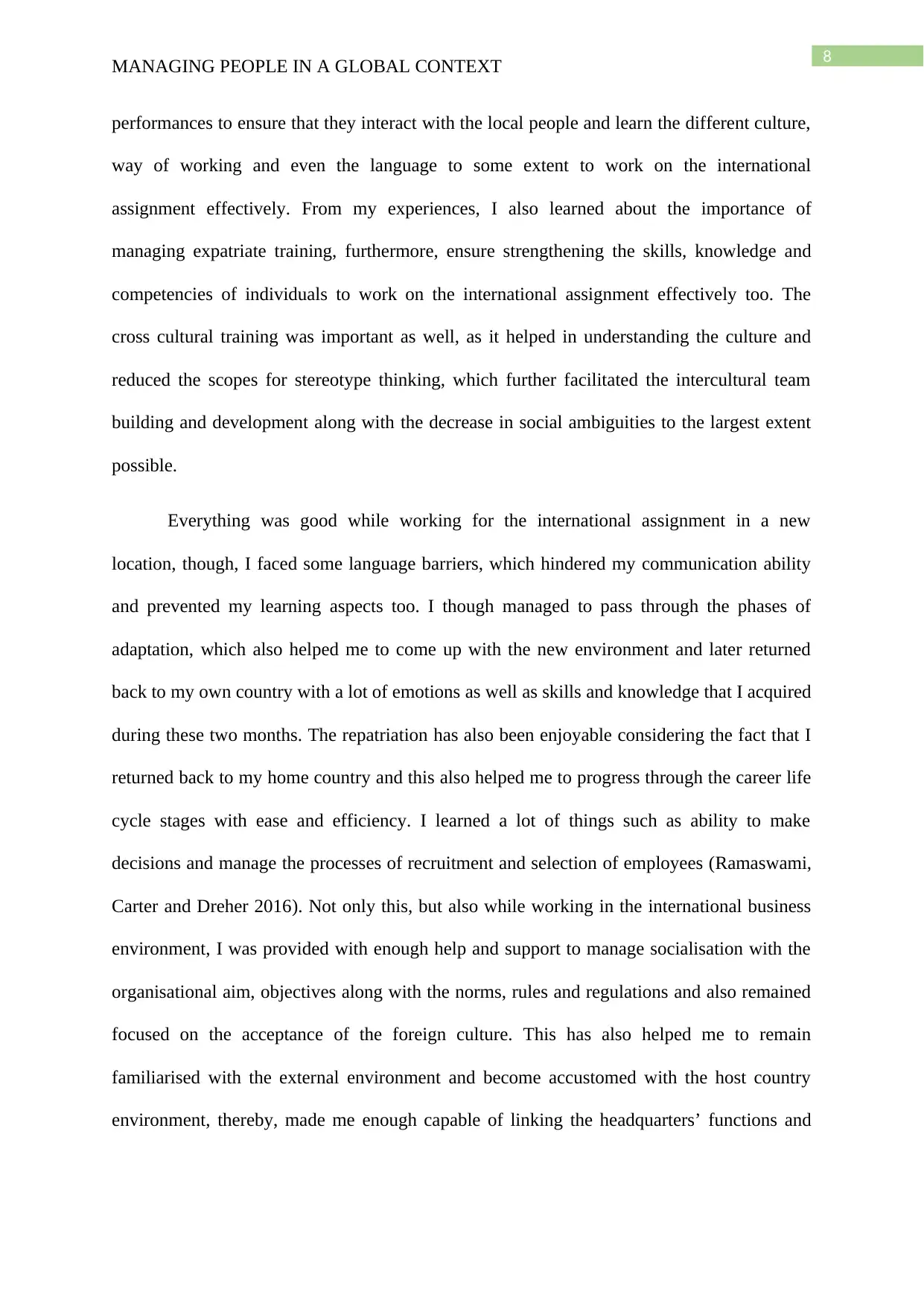
8
MANAGING PEOPLE IN A GLOBAL CONTEXT
performances to ensure that they interact with the local people and learn the different culture,
way of working and even the language to some extent to work on the international
assignment effectively. From my experiences, I also learned about the importance of
managing expatriate training, furthermore, ensure strengthening the skills, knowledge and
competencies of individuals to work on the international assignment effectively too. The
cross cultural training was important as well, as it helped in understanding the culture and
reduced the scopes for stereotype thinking, which further facilitated the intercultural team
building and development along with the decrease in social ambiguities to the largest extent
possible.
Everything was good while working for the international assignment in a new
location, though, I faced some language barriers, which hindered my communication ability
and prevented my learning aspects too. I though managed to pass through the phases of
adaptation, which also helped me to come up with the new environment and later returned
back to my own country with a lot of emotions as well as skills and knowledge that I acquired
during these two months. The repatriation has also been enjoyable considering the fact that I
returned back to my home country and this also helped me to progress through the career life
cycle stages with ease and efficiency. I learned a lot of things such as ability to make
decisions and manage the processes of recruitment and selection of employees (Ramaswami,
Carter and Dreher 2016). Not only this, but also while working in the international business
environment, I was provided with enough help and support to manage socialisation with the
organisational aim, objectives along with the norms, rules and regulations and also remained
focused on the acceptance of the foreign culture. This has also helped me to remain
familiarised with the external environment and become accustomed with the host country
environment, thereby, made me enough capable of linking the headquarters’ functions and
MANAGING PEOPLE IN A GLOBAL CONTEXT
performances to ensure that they interact with the local people and learn the different culture,
way of working and even the language to some extent to work on the international
assignment effectively. From my experiences, I also learned about the importance of
managing expatriate training, furthermore, ensure strengthening the skills, knowledge and
competencies of individuals to work on the international assignment effectively too. The
cross cultural training was important as well, as it helped in understanding the culture and
reduced the scopes for stereotype thinking, which further facilitated the intercultural team
building and development along with the decrease in social ambiguities to the largest extent
possible.
Everything was good while working for the international assignment in a new
location, though, I faced some language barriers, which hindered my communication ability
and prevented my learning aspects too. I though managed to pass through the phases of
adaptation, which also helped me to come up with the new environment and later returned
back to my own country with a lot of emotions as well as skills and knowledge that I acquired
during these two months. The repatriation has also been enjoyable considering the fact that I
returned back to my home country and this also helped me to progress through the career life
cycle stages with ease and efficiency. I learned a lot of things such as ability to make
decisions and manage the processes of recruitment and selection of employees (Ramaswami,
Carter and Dreher 2016). Not only this, but also while working in the international business
environment, I was provided with enough help and support to manage socialisation with the
organisational aim, objectives along with the norms, rules and regulations and also remained
focused on the acceptance of the foreign culture. This has also helped me to remain
familiarised with the external environment and become accustomed with the host country
environment, thereby, made me enough capable of linking the headquarters’ functions and
⊘ This is a preview!⊘
Do you want full access?
Subscribe today to unlock all pages.

Trusted by 1+ million students worldwide
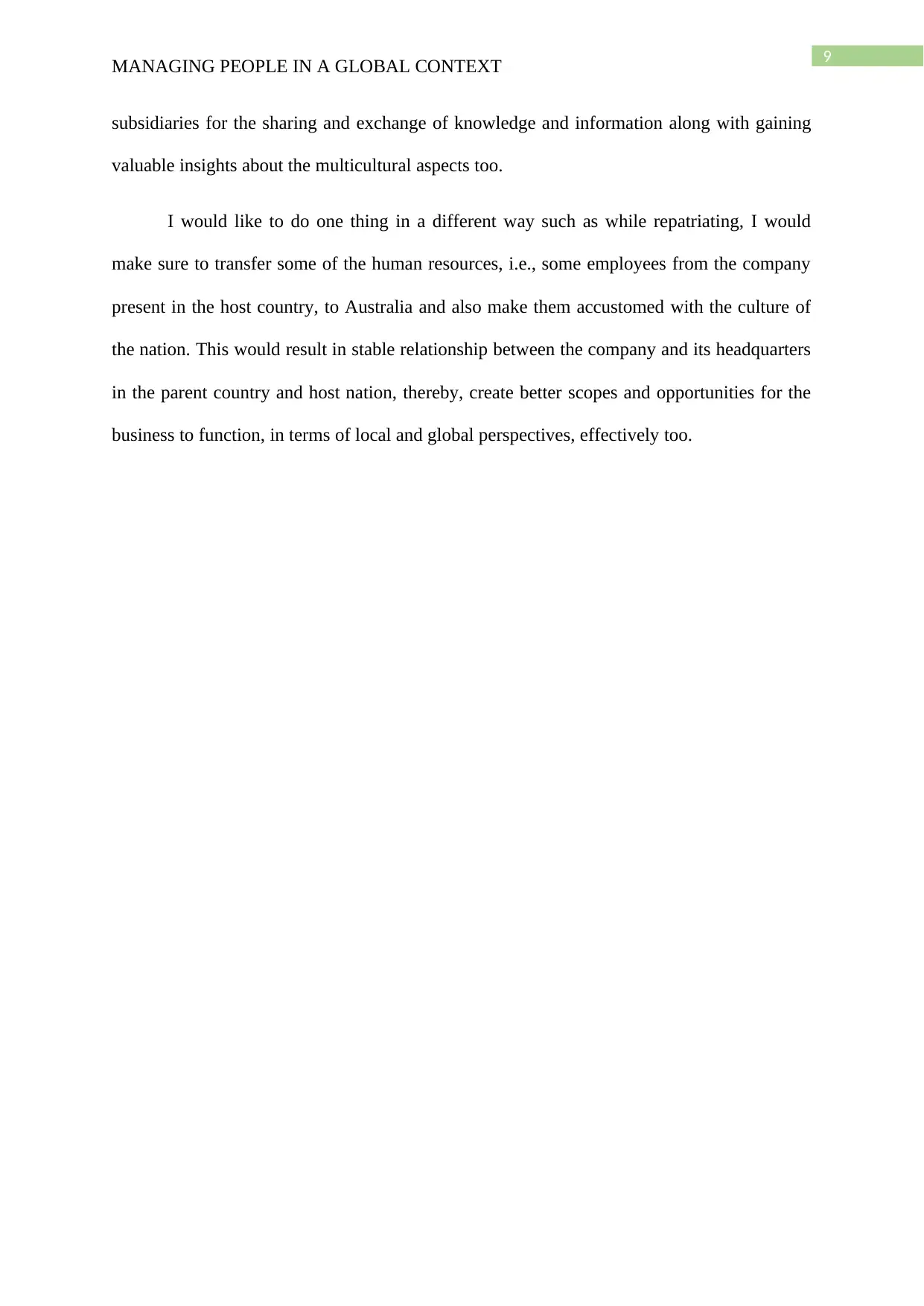
9
MANAGING PEOPLE IN A GLOBAL CONTEXT
subsidiaries for the sharing and exchange of knowledge and information along with gaining
valuable insights about the multicultural aspects too.
I would like to do one thing in a different way such as while repatriating, I would
make sure to transfer some of the human resources, i.e., some employees from the company
present in the host country, to Australia and also make them accustomed with the culture of
the nation. This would result in stable relationship between the company and its headquarters
in the parent country and host nation, thereby, create better scopes and opportunities for the
business to function, in terms of local and global perspectives, effectively too.
MANAGING PEOPLE IN A GLOBAL CONTEXT
subsidiaries for the sharing and exchange of knowledge and information along with gaining
valuable insights about the multicultural aspects too.
I would like to do one thing in a different way such as while repatriating, I would
make sure to transfer some of the human resources, i.e., some employees from the company
present in the host country, to Australia and also make them accustomed with the culture of
the nation. This would result in stable relationship between the company and its headquarters
in the parent country and host nation, thereby, create better scopes and opportunities for the
business to function, in terms of local and global perspectives, effectively too.
Paraphrase This Document
Need a fresh take? Get an instant paraphrase of this document with our AI Paraphraser
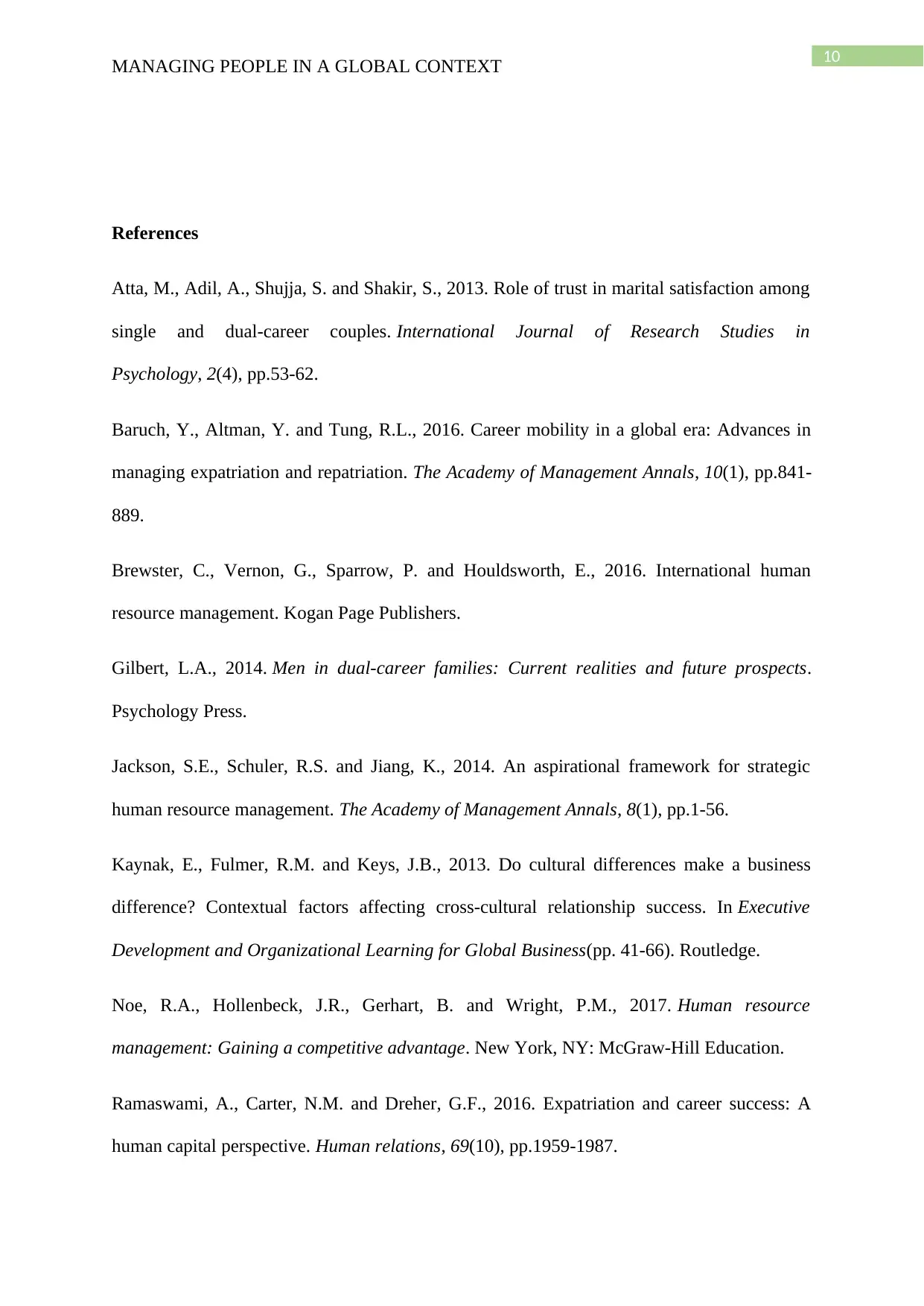
10
MANAGING PEOPLE IN A GLOBAL CONTEXT
References
Atta, M., Adil, A., Shujja, S. and Shakir, S., 2013. Role of trust in marital satisfaction among
single and dual-career couples. International Journal of Research Studies in
Psychology, 2(4), pp.53-62.
Baruch, Y., Altman, Y. and Tung, R.L., 2016. Career mobility in a global era: Advances in
managing expatriation and repatriation. The Academy of Management Annals, 10(1), pp.841-
889.
Brewster, C., Vernon, G., Sparrow, P. and Houldsworth, E., 2016. International human
resource management. Kogan Page Publishers.
Gilbert, L.A., 2014. Men in dual-career families: Current realities and future prospects.
Psychology Press.
Jackson, S.E., Schuler, R.S. and Jiang, K., 2014. An aspirational framework for strategic
human resource management. The Academy of Management Annals, 8(1), pp.1-56.
Kaynak, E., Fulmer, R.M. and Keys, J.B., 2013. Do cultural differences make a business
difference? Contextual factors affecting cross-cultural relationship success. In Executive
Development and Organizational Learning for Global Business(pp. 41-66). Routledge.
Noe, R.A., Hollenbeck, J.R., Gerhart, B. and Wright, P.M., 2017. Human resource
management: Gaining a competitive advantage. New York, NY: McGraw-Hill Education.
Ramaswami, A., Carter, N.M. and Dreher, G.F., 2016. Expatriation and career success: A
human capital perspective. Human relations, 69(10), pp.1959-1987.
MANAGING PEOPLE IN A GLOBAL CONTEXT
References
Atta, M., Adil, A., Shujja, S. and Shakir, S., 2013. Role of trust in marital satisfaction among
single and dual-career couples. International Journal of Research Studies in
Psychology, 2(4), pp.53-62.
Baruch, Y., Altman, Y. and Tung, R.L., 2016. Career mobility in a global era: Advances in
managing expatriation and repatriation. The Academy of Management Annals, 10(1), pp.841-
889.
Brewster, C., Vernon, G., Sparrow, P. and Houldsworth, E., 2016. International human
resource management. Kogan Page Publishers.
Gilbert, L.A., 2014. Men in dual-career families: Current realities and future prospects.
Psychology Press.
Jackson, S.E., Schuler, R.S. and Jiang, K., 2014. An aspirational framework for strategic
human resource management. The Academy of Management Annals, 8(1), pp.1-56.
Kaynak, E., Fulmer, R.M. and Keys, J.B., 2013. Do cultural differences make a business
difference? Contextual factors affecting cross-cultural relationship success. In Executive
Development and Organizational Learning for Global Business(pp. 41-66). Routledge.
Noe, R.A., Hollenbeck, J.R., Gerhart, B. and Wright, P.M., 2017. Human resource
management: Gaining a competitive advantage. New York, NY: McGraw-Hill Education.
Ramaswami, A., Carter, N.M. and Dreher, G.F., 2016. Expatriation and career success: A
human capital perspective. Human relations, 69(10), pp.1959-1987.
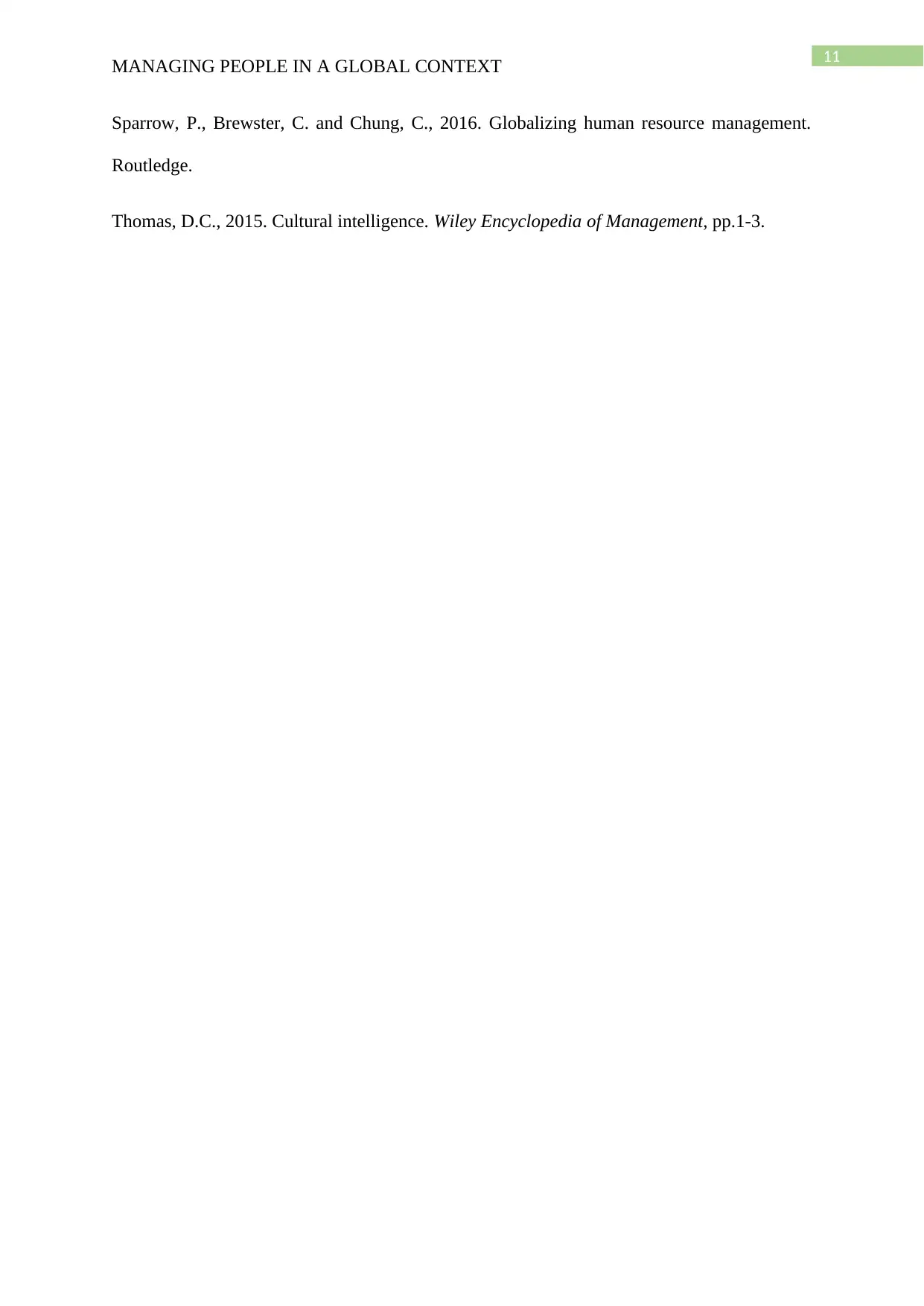
11
MANAGING PEOPLE IN A GLOBAL CONTEXT
Sparrow, P., Brewster, C. and Chung, C., 2016. Globalizing human resource management.
Routledge.
Thomas, D.C., 2015. Cultural intelligence. Wiley Encyclopedia of Management, pp.1-3.
MANAGING PEOPLE IN A GLOBAL CONTEXT
Sparrow, P., Brewster, C. and Chung, C., 2016. Globalizing human resource management.
Routledge.
Thomas, D.C., 2015. Cultural intelligence. Wiley Encyclopedia of Management, pp.1-3.
⊘ This is a preview!⊘
Do you want full access?
Subscribe today to unlock all pages.

Trusted by 1+ million students worldwide
1 out of 12
Related Documents
Your All-in-One AI-Powered Toolkit for Academic Success.
+13062052269
info@desklib.com
Available 24*7 on WhatsApp / Email
![[object Object]](/_next/static/media/star-bottom.7253800d.svg)
Unlock your academic potential
Copyright © 2020–2026 A2Z Services. All Rights Reserved. Developed and managed by ZUCOL.



